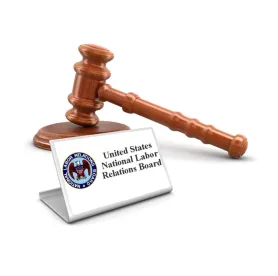A divided three-judge panel of the D.C. Circuit Court of Appeals partially affirmed a federal district court’s decision to vacate part of a rule issued by the National Labor Relations Board (the “Board”) in 2019 that eliminated several “quickie” representation election procedures established by a 2014 rule (the “2014 rule”).
In 2019, the Board issued this rule (the “2019 rule”), which changed a number of provisions from the 2014 rule that dramatically sped up the timeline for representation elections. The practical effect of the 2019 rule, which we discussed here, was to impose a more deliberate pace on the election process, thus allowing more time for resolution of disputes.
The Board promulgated the 2019 rule without a notice-and-comment period, taking the position that the rule fell within an exception to the Administrative Procedure Act’s typical notice-and-comment requirement (the “APA exception”) for federal rulemaking. The APA exception allows federal agencies to promulgate rules relating to the agency’s internal organization, procedure, or practice—i.e., “housekeeping” rules that do not affect regulated parties’ rights or interests—without notice-and-comment.
The AFL-CIO challenged the 2019 rule in the District Court for the District of Columbia, claiming that the rule was substantive and that the APA therefore required the Board to provide a public notice-and-comment period. On May 30, 2020—one day before the 2019 rule was to go into effect—the district court struck down several of the rule’s provisions as substantive rather than procedural.
On appeal, the panel only affirmed the district court’s ruling on these grounds as to three of the five challenged provisions of the 2019 rule:
-
Voter List Production – The 2019 rule extended the period within which employers must provide a list of eligible voters to the union following the Regional Director issuing a direction of an election, from two business days (as permitted by the 2014 rule) to five. The panel’s holding means that employers must continue to produce voter lists in the shorter timeframe, which employers complain has led to increased possibility of errors.
-
Delayed Certification – The 2019 rule directed Regional Directors to certify election results only after any requests for review by the Board had been resolved or, in the absence of requests, after the window to seek review had passed. The 2014 rule directed Regional Directors to certify elections regardless of whether a request for review had been filed. Because an employer’s duty to bargain with a union arises only when that union has been certified, this rule change directly affected when this duty attaches.
-
Election Observers – The 2019 rule imposed narrower criteria on who may be selected as an election observer, requiring that observers be a current member of the voting unit or, if such an individual is not available, a current non-supervisory employee. (The 2014 rule permitted any observer of the parties’ choosing, subject to the Regional Director’s limitations.) Even though the National Labor Relations Act (the “Act”) does not create a substantive right to election observers, the panel reasoned that imposing new observer requirements substantively affected the parties’ interests in fair elections.
However, the panel found that the District Court erred by vacating two additional provisions from the 2019 rule as requiring notice-and-comment, finding that these two provisions merely regulated the Board’s internal “housekeeping” matters and thus fell within the APA exception:
-
Pre-Election Litigation of Certain Issues – The 2019 rule permits parties to litigate disputes regarding voter eligibility, unit scope, and supervisory status in front of the Regional Director before the election takes place. The 2014 rule allowed these disputes to be resolved after an election.
-
Election Scheduling – The 2019 rule established a presumptive waiting period of 20 business days between the Regional Director directing an election and the actual election date. Besides this waiting period, which allows for possible requests for review to the Board, the 2019 rule did not otherwise change the “earliest date practicable” standard for scheduling an election.
Retaining these timing changes will allow for more thoughtful and efficient dispute resolution so that elections can go forward without pending challenges hanging over the parties’ heads.
The panel also found that, contrary to the AFL-CIO’s arguments, the 2019 rule was not arbitrary and capricious as a whole. In promulgating the rule, the Board acknowledged that the rule would have the effect of making elections take longer but reasonably explained that its purpose in promulgating the rule was to promote election transparency, uniformity, finality, and certainty.
Finally, the panel struck down a provision of the 2019 rule that permits an election to go forward even if one party has filed a request for review, so long as the ballots are impounded and remain unopened pending the review’s decision. The panel agreed with the AFL-CIO that this provision violated the Act’s prohibition on the Board’s review operating as a “stay of action” taken by a Regional Director.
Takeaways
It is doubtful this ruling will change the way elections are being conducted today. In response to the panel’s decision, Board Chair Lauren McFerran stated the Board will not change how it administers elections, noting that the decision may be appealed, and that the agency is con
Even though the panel reversed the district court’s order vacating the pre-election litigation and election scheduling provisions of the 2019 rule, it also remanded the matter back to the district court to consider the AFL-CIO’s other arguments against them in the first instance. Therefore, it is possible that these two provisions will still ultimately be found invalid on some other grounds.
Either side still may decide to further appeal this decision, first to the full D.C. Circuit and potentially up to the Supreme Court, where Justice Ketanji Brown Jackson—who authored the May 2020 district court decision striking down these provisions—now sits.
As for the three provisions that the panel agreed fell outside of the APA exception—regarding voter list production, delayed certification, and election observers—the panel’s holding orders that they will remain vacated unless and until the Board re-promulgates them with a notice-and-comment period.




 />i
/>i

